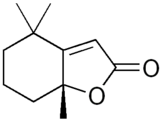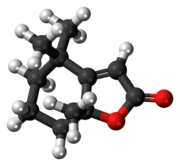
| |

| |
| Names | |
|---|---|
| Preferred IUPAC name
(7aR)-4,4,7a-Trimethyl-5,6,7,7a-tetrahydro-1-benzofuran-2(4H)-one | |
| Other names
Dihydroactinidiolide
| |
| Identifiers | |
3D model (JSmol)
|
|
| ChemSpider | |
| ECHA InfoCard | 100.169.249 |
PubChem CID
|
|
| UNII | |
CompTox Dashboard (EPA)
|
|
| |
| |
| Properties | |
| C11H16O2 | |
| Molar mass | 180.24 g/mol |
Except where otherwise noted, data are given for materials in their standard state (at 25 °C [77 °F], 100 kPa).
| |
Dihydroactinidiolide is a volatile terpene. It has a sweet, tea-like odor and is used as a fragrance. Dihydroactinidiolide occurs naturally in black tea, fenugreek, fire ants, mangoes, and tobacco. It has also been prepared synthetically.[1]
Dihydroactinidiolide is a pheromone for a variety of insects;[2] for example, it is one of the three components of the pheromone for queen recognition of the workers of the red fire ant.[3]
- ^ S. Yao, M. Johannsen, R.G. Hazell, K.A. Jorgensen, J. Org. Chem., 63, 118-121.
- ^ Pherobase listing for dihydroactinidiolide
- ^ Rocca, J.R. Tumlinson, J.H., Glancey, B.M., Lofgren, C.S., Tetrahedron Lett., 1983, 24, 1889.